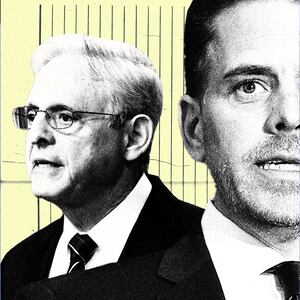Hunter Biden, the son of President Joe Biden, was finally indicted by the feds on Thursday on three criminal counts of illegally obtaining a handgun by lying about his illicit drug use when he filled out paperwork to buy a .38 Special revolver.
The long-awaited move came after plea negotiations broke down in spectacular fashion during a court hearing in July, when prosecutors announced they weren’t completely dropping an overarching investigation and irked defense lawyers blurted out that the deal was off. The plea deal, if it had gone ahead, would have allowed Biden to plead guilty to a pair of misdemeanor tax offenses in exchange for avoiding prosecution on the gun crimes. Now, the younger Biden is staring down a criminal trial in federal court.
Thursday’s four-page indictment was a bare-bones court document, merely repeating what the public already knows: Buying from a licensed gun shop requires filling out a government form that affirms the person isn’t a criminal or engaged in certain illegal activity—something Biden appears to have flagrantly violated.
ADVERTISEMENT
In his memoir, Beautiful Things, the president’s son described his battles with addiction and the way he would “smoke crack every 15 minutes.” Notably, that time period overlapped with his decision to purchase the Colt Cobra revolver on Oct. 12, 2018.
“Robert Hunter Biden,” the indictment says, “provided a written statement on Form 4473 certifying he was not an unlawful user of, and addicted to, any stimulant, narcotic drug, and any other controlled substance, when in fact, as he knew, that statement was false and fictitious.”
For years, Republicans have been clamoring for the Department of Justice to pursue criminal charges against Biden and his family—alleging vast conspiracies that purport to tie the family’s finances with Chinese interests and call into question whether members have improperly used proximity to power to expand their wealth and influence. However, particular attention has been paid to the president’s only living son, Hunter, who became a wealthy attorney and snagged lucrative roles that dealt with international business.
Conservatives criticized how the DOJ spent years investigating the younger Biden without charging him, and earlier this year, the feds seemed to inch forward with a muted criminal case that went after him for dodging taxes while simultaneously letting him off on the gun crimes. But after negotiations broke down, Attorney General Merrick Garland elevated Delaware’s U.S. Attorney David Weiss, who was already overseeing the investigation, to “special counsel” status that afforded him more independence.
The DOJ’s decision to charge Biden now in a separate case for the gun crimes shows that investigators are taking a more hardlined approach—but one that isn’t necessarily out of character.
The FBI regularly investigates violations of 18 U.S. Code § 922, which restricts how someone may buy or sell firearms. It’s the go-to statute for prosecutors seeking to imprison felons who manage to acquire guns after serving time in prison, straw purchasers who buy a gun with the specific intent to sell it to another person, and other people who aren’t allowed to acquire them. In that sense, the case is a run-of-the-mill prosecution—and the reason why so many criticized the DOJ for not bringing the case against the president’s son earlier.
However, the particular charge levied against Biden is one that’s rarely used as a standalone case. Federal agents tend to see the charge, 922(g)(3), as a tool to squeeze information from a suspect as part of a much larger drug trafficking or gang investigation. Former cops told The Daily Beast that it’s not prosecuted often for a few reasons: first, so many Americans regularly use illegal drugs like cannabis that uniform enforcement is impossible and too taxing on resources. But second, chasing after casual drug users who buy weapons isn’t a priority until those people commit more serious, violent crimes.
On the gun charges alone, Biden now faces fines and up to 10 years in prison.








